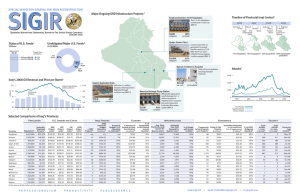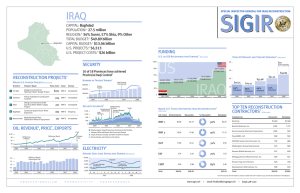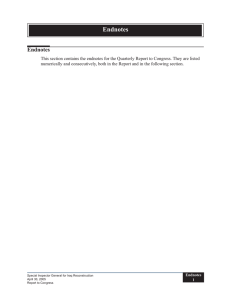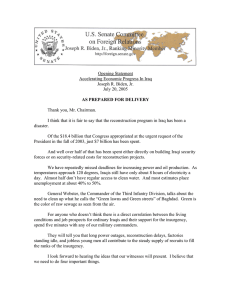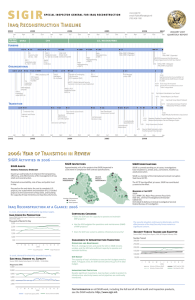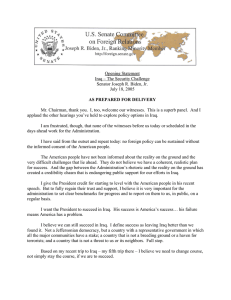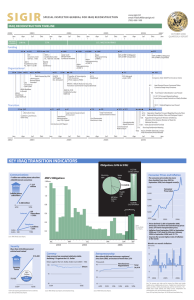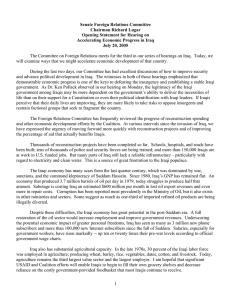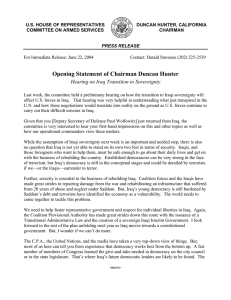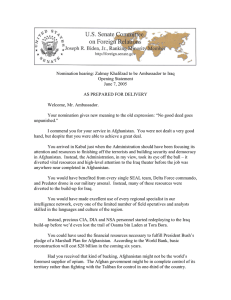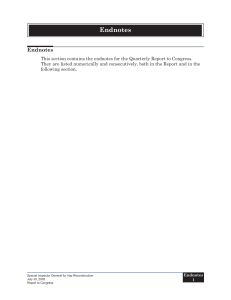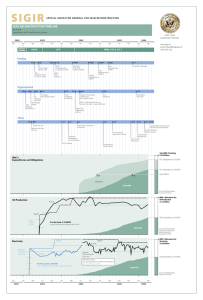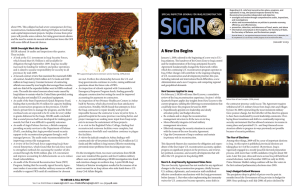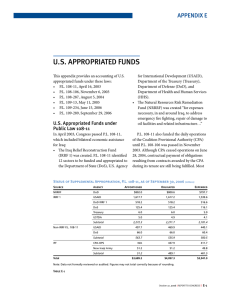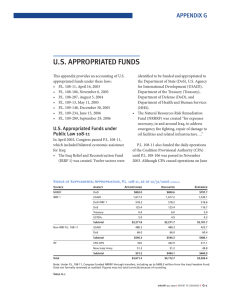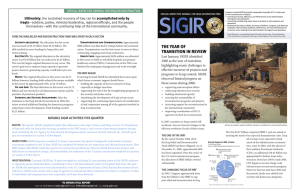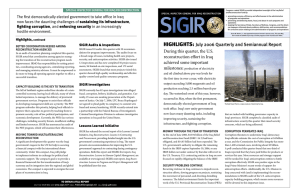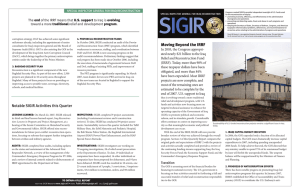TESTIMONY BY AMBASSADOR JAMES JEFFREY BEFORE
advertisement
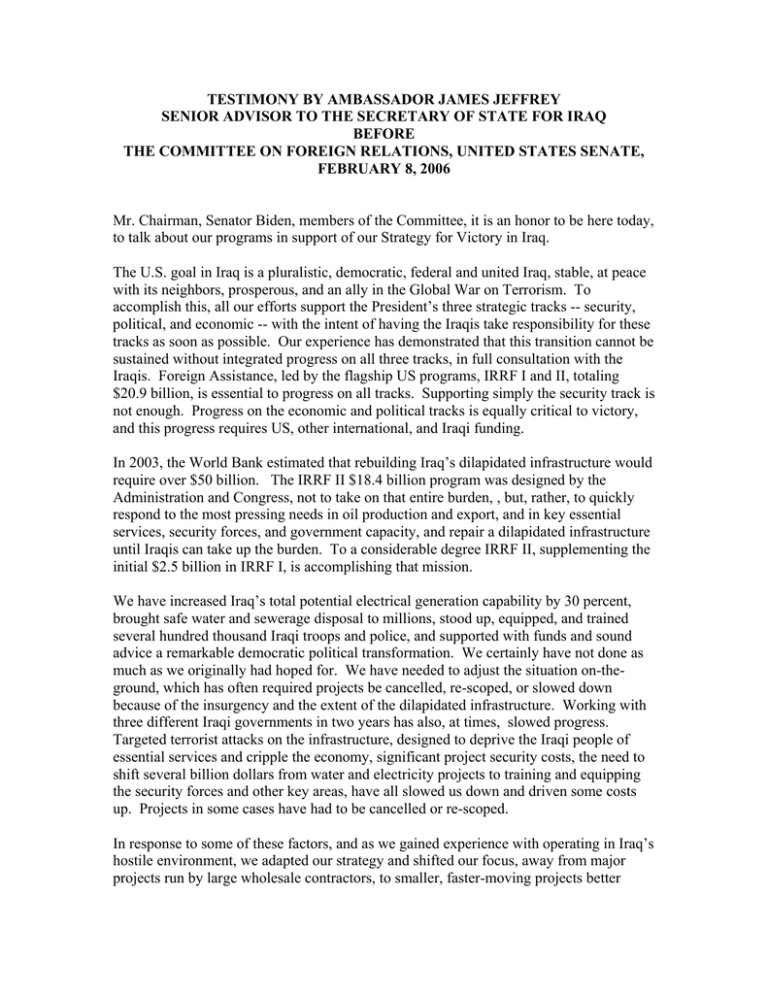
TESTIMONY BY AMBASSADOR JAMES JEFFREY SENIOR ADVISOR TO THE SECRETARY OF STATE FOR IRAQ BEFORE THE COMMITTEE ON FOREIGN RELATIONS, UNITED STATES SENATE, FEBRUARY 8, 2006 Mr. Chairman, Senator Biden, members of the Committee, it is an honor to be here today, to talk about our programs in support of our Strategy for Victory in Iraq. The U.S. goal in Iraq is a pluralistic, democratic, federal and united Iraq, stable, at peace with its neighbors, prosperous, and an ally in the Global War on Terrorism. To accomplish this, all our efforts support the President’s three strategic tracks -- security, political, and economic -- with the intent of having the Iraqis take responsibility for these tracks as soon as possible. Our experience has demonstrated that this transition cannot be sustained without integrated progress on all three tracks, in full consultation with the Iraqis. Foreign Assistance, led by the flagship US programs, IRRF I and II, totaling $20.9 billion, is essential to progress on all tracks. Supporting simply the security track is not enough. Progress on the economic and political tracks is equally critical to victory, and this progress requires US, other international, and Iraqi funding. In 2003, the World Bank estimated that rebuilding Iraq’s dilapidated infrastructure would require over $50 billion. The IRRF II $18.4 billion program was designed by the Administration and Congress, not to take on that entire burden, , but, rather, to quickly respond to the most pressing needs in oil production and export, and in key essential services, security forces, and government capacity, and repair a dilapidated infrastructure until Iraqis can take up the burden. To a considerable degree IRRF II, supplementing the initial $2.5 billion in IRRF I, is accomplishing that mission. We have increased Iraq’s total potential electrical generation capability by 30 percent, brought safe water and sewerage disposal to millions, stood up, equipped, and trained several hundred thousand Iraqi troops and police, and supported with funds and sound advice a remarkable democratic political transformation. We certainly have not done as much as we originally had hoped for. We have needed to adjust the situation on-theground, which has often required projects be cancelled, re-scoped, or slowed down because of the insurgency and the extent of the dilapidated infrastructure. Working with three different Iraqi governments in two years has also, at times, slowed progress. Targeted terrorist attacks on the infrastructure, designed to deprive the Iraqi people of essential services and cripple the economy, significant project security costs, the need to shift several billion dollars from water and electricity projects to training and equipping the security forces and other key areas, have all slowed us down and driven some costs up. Projects in some cases have had to be cancelled or re-scoped. In response to some of these factors, and as we gained experience with operating in Iraq’s hostile environment, we adapted our strategy and shifted our focus, away from major projects run by large wholesale contractors, to smaller, faster-moving projects better integrated with our political and security lines of operation. Examples of this approach abound, be it the funds then-Ambassador Negroponte shifted to democracy programs, CERP funding before the January 2005 elections, or the innovative, creative USAID construction support for the 1st Cavalry Division’s operations in Baghdad against the Mahdi militia. Thus, while we had intended that our funding would enable completion of a greater number of projects, we are pleased with its contribution to the overall strategy for stability and security in Iraq. The political process has made immense progress, Iraqi security forces are making a powerful difference, and the Iraqi population strongly rejects the insurgency and participates in the political process. To ensure that the benefits of this progress reach the entire Iraqi population, we have initiated Provincial Reconstruction Teams to strengthen provincial and regional governments. I am also delighted to be here today with my colleague and fellow Baghdad veteran, Mr. Stuart Bowen. The work of his organization, the Special Inspector General for Iraq Reconstruction (SIGIR), and that of the other Inspector and Audit operations that monitor our activities in Iraq, are vitally important. Just as with other U.S. civilian and military people on the ground, they are doing a tremendous job under austere and dangerous conditions. Secretary Rice encouraged my presence here today and reiterated her commitment made just last week to Mr. Bowen to support his agency’s activities in every way possible. I know Ambassador Zal Khalilzad echoes these sentiments. We believe in SIGIR because we are fully aware of our responsibilities to you and to the American people for the immense amount of money placed in our trust, and for the life and death responsibilities we all bear in carrying out our work in Iraq as part of the broader war on terror. But to do our job, we need advice, oversight, transparency, and immediate response to allegations of fraud and mismanagement. Mr. Bowen and SIGIR, ably assisted by the other inspection and audit agencies in the field, have fulfilled these missions with great professionalism. I want to particularly highlight the signature work of SIGIR in evaluating management strategy and big picture issues related to our IRRF strategy, to complement its invaluable auditing, inspecting, and investigatory missions. We listen closely to SIGIR’s suggestions, and many of our actions, from direct contracting, including with Iraqis, to our focus on cost-to-complete, and plans for operations and maintenance of our projects, reflect SIGIR’s input. For example, we have put over $150 million in our FY 2007 budget submission for operations and maintenance follow up, and have begun a program we call ART, or Asset Recognition and Transfer, to ensure the Iraqis are ready to take over projects we have helped to rebuild or put in place. We do not agree with everything which SIGIR has proposed but we have the highest professional respect for our SIGIR colleagues, and take their views most seriously. What we do recognize is that the IRRF alone will not complete our work, as Mr. Bowen has suggested. But right now, our priority will be to complete the IRRF program’s projects that are vital to boosting the Iraqi economy and capacity. At the same time, we will continue to work to convince our friends and allies to disburse the remainder of the $13.5 billion pledged at the Madrid Conference and consider additional funding.. Our FY 2007 assistance submission of $771 million represents a shift away from the large infrastructure projects the IRRF funded to a focused capacity-building program that will help enable Iraqis to build and sustain a democratic society and healthy economy. Some of the programs funded will include infrastructure sustainment, capacity building at core Iraqi ministries, agricultural development, and rule of law programs. We will look to your support and that of the entire Senate and House for our continued activities in Iraq, including our own State Department operating budget. Finally, let me again today commit the Department of State and our Mission in Baghdad to the most efficient, transparent, cost-conscious execution of funds entrusted to us, in the service of extraordinary national objectives, and to the best possible working relationship with Mr. Bowen and his colleagues.
